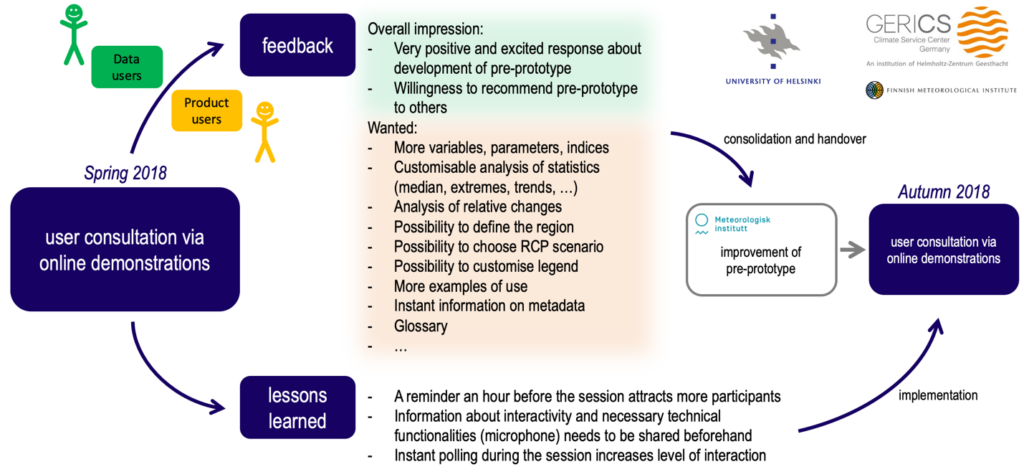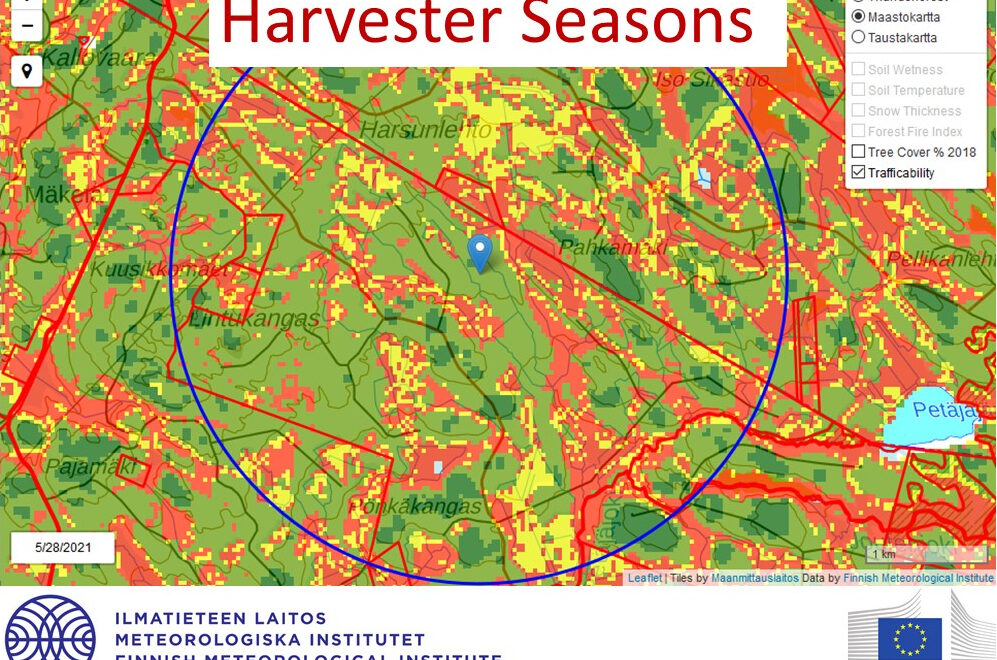For a well-functioning and user-friendly operational climate service, it is important to consider the user needs and technical possibilities. Here, we describe the co-design process involving users that took place in a C3S contract.
ANTTI MÄKELÄ1, JULIANE EL ZOHBI2, JOUNI RÄISÄNEN3, TIINA ERVASTI1, ELISABETH VIKTOR2, RASMUS BENESTAD4, ABDELKADER MEZGHANI4, ANDREAS DOBLER4, OLLE RÄTY3, HILPPA GREGOW1
1Finnish Meteorological Institute, 2Helmholtz-Zentrum Geesthacht, Climate Service Center Germany (GERICS), 3University of Helsinki, 4Norwegian Meteorological Institute
The main challenges in the usability of climate projections in climate change adaptation and impact research are the nature of the data, the non-trivial access to the information embedded in the climate data (Benestad et al., 2017), and the interpretation of the climate data quality (Zahid et al., 2019). The Copernicus Climate Change Service (C3S) is already providing access to climate projection data. However, merely the access to the data is not enough to establish wider usage; guidance on selecting the right data for the users’ specific purposes is indispensable.
Within C3S, as part of the “Data Evaluation for Climate Models – DECM” contract, researchers from various institutions joined efforts to develop a prototype of a web-application called “DECM App” that is currently running on a virtual machine hosted by C3S and accessible at https://decm.copernicus-climate.eu/. The functions and usability of the “DECM App” originated i) from the co-design process involving the project experts and volunteer pilot users (Fig. 1) ii) through on-line and iii) live demonstration sessions. The first version of the App was launched in 2017 and it was developed into its final version during 2018. A two-way feedback mechanism helped improving the content and functionalities to enable quick and easy evaluation and quality control of climate projection data (global and regional), even in specific areas.
In spring 2018, the University of Helsinki tested the “DECM App” in the academic course “Greenhouse effect, climate change, and impacts” involving 18 students, who received four research questions focusing on the usability of the App. The co-design process continued with a total of eight on-line demonstration sessions that included a chance to give anonymous feedback after each session. From there, the prototype was developed further according to the user feedback. Also, a blog page was created to inform the (pilot) users about the progress of new developments. By the end of the pilot year 2018, the “DECM App” had reached a total of 585 unique users, over 2000 sessions, and more than 4000 page views. In February 2019, the “DECM App” was included in the C3S Climate Data Store collection and was officially opened for European and global use.
Based on the reassuring experiences from the DECM contract and feedback from the users, we recommend the prescribed approach for climate service development in general.
References
Benestad, R., et al., 2017: New vigour involving statisticians required to overcome ensemble fatigue, Nature Climate Change, DOI: 10.1038/NCLIMATE3393.
Zahid, M., et al., 2019: What does quality mean to climate data users/providers and how to enable them to evaluate the quality of climate model data and derived products? Handbook of Climate Services (in final revision).
Header image: Pixabay
HOW TO CITE THIS ARTICLE:
Mäkelä A., El Zohbi J., Räisänen J., Ervasti T., Viktor E., Benestad R., Mezghani A., Dobler A., Räty O., and Gregow H., 2019: Managing Development of a Novel Climate Service Application called the “DECM App”, FMI’s Climate Bulletin: Research Letters, 1(2), 11, DOI: 10.35614/ISSN-2341-6408-IK-2019-20-RL
CITATION INFORMATION:
Authors: Antti Mäkelä, Juliane El Zohbi, Jouni Räisänen, Tiina Ervasti, Elisabeth Viktor, Rasmus Benestad, Abdelkader Mezghani, Andreas Dobler, Olle Räty, and Hilppa Gregow
Received: September 10, 2019
Accepted: December 13, 2019
First online: December 19, 2019
Journal: FMI’s Climate Bulletin: Research Letters
Volume: 1
Issue: 2
Page: 11
DOI: 10.35614/ISSN-2341-6408-IK-2019-20-RL





